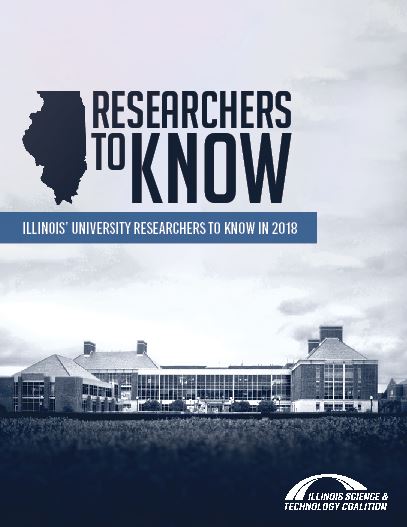
Researchers to Know 2018
Each year, the Illinois Science & Technology Coalition (ISTC) releases detailed metrics benchmarking Illinois’ innovation economy through our Illinois Innovation Index. This includes annual data on the volume of startups founded by students and faculty at Illinois universities, as well as research activity and output across the state’s campuses. While we view these metrics as vital for assessing Illinois’ progress in key economic development areas, taking this big-picture view of innovation can overlook the groundbreaking research being conducted by world-class researchers at our campuses across the state.
This year, to highlight university researchers who have made a significant impact in their field, ISTC is releasing its first annual list of “Researchers to Know” at Illinois’ universities. Though this list is far from comprehensive, it provides a more detailed look at some of the researchers that are driving innovation in the state—from those advancing new treatments in medicine and tackling cancer, to those revolutionizing computing and shaping new technologies in the 21st century.
To create this list of distinguished researchers, ISTC reached out to university partners across the state to nominate faculty that have demonstrated excellence in their work. An emphasis was also placed on researchers that have recently achieved milestones, such as publishing an influential paper, receiving national recognition, or commercializing a new innovation. What follows is a cross-section of noteworthy faculty from all corners of the state – each possessing unique research strengths that illustrate the critical role of Illinois’ university research in the national innovation economy.
RESEARCHER INTERVIEWS
Prof. Edward Colgate, Northwestern University
Prof. Brandon Cox, Southern Illinois University School of Medicine
Prof. Lori Andrews, Illinois Tech Chicago Kent College of Law
Advancing Medicine:
Technologists:
Tackling Cancer:
Rising Stars:

Paul Garris
Illinois State University
PARKINSON’S • DRUG ABUSE • MICRODEVICES
Research Description
Paul Garris is a Distinguished University Professor of Neurobiology at Illinois State University. Prof. Garris has spent nearly 35 years investigating the role of dopamine in the brain. This research offers key insight into Parkinson’s disease, a longtime research area of interest for Prof. Garris. Discoveries made through Prof. Garris’ research on dopamine also have critical implications in the field of drug abuse and prevention. The strength of Prof. Garris’ research has led to grant funding from the National Institutes of Health, National Science Foundation, Department of Defense, American Heart Association, and the Whitehall Foundation.
Developing from his wider research, Prof. Garris is a national leader in the development of microsensor technology for the brain. Prof. Garris worked with the Mayo Clinic to develop a wireless device that records neurochemistry in the brain during surgery. At present, Prof. Garris is currently working with Pedram Mohseni, an electrical engineer at Case Western Reserve University, to develop a microdevice to control dopamine levels in the brain. The device, which has been shown to be effective in rats, could have a profound impact on the treatment of addiction by limiting dopamine levels produced by the use of methamphetamine and other abused drugs.

Jerry Krishnan
University of Illinois College of Medicine at Chicago
ASTHMA • COPD • PATIENT OUTCOMES
Research Description
Jerry Krishnan is a Professor of Medicine and Public Health, and Associate Vice Chancellor for Population Health Sciences at the University of Illinois College of Medicine in Chicago. Prof. Krishnan is a practicing pulmonologist and researcher with expertise in the care of patients with asthma, chronic obstructive pulmonary disease (COPD), and other complex obstructive lung disorders. His area of research expertise is delivery science, which seeks to identify care strategies that improve the quality, outcomes, and value of healthcare. Specifically, Prof. Krishnan is a leader in the field of comparative effectiveness research methods in asthma and chronic obstructive pulmonary disease (COPD), exploring outcomes associated with alternative treatments.
Prof. Krishnan’s research on treatment effectiveness is sponsored by the National Institutes of Health (NIH), National Heart, Lung, and Blood Institute (NHLBI), and the Patient-Centered Outcomes Research Institute (PCORI), where he serves as a chair of the PCORI Improving Healthcare Systems merit review panel. Prof. Krishnan has served as Chair of the Pulmonary-Allergy Drugs Advisory Committee for the U.S. Food and Drug Administration (FDA), and is a member of the National Committee for Quality Assurance (NCQA) Respiratory Measurement Advisory Panel and the National Heart, Lung, and Blood Institute’s Clinical Trials Review Committee.

Elizabeth McNally
Northwestern University
GENETICS • MUSCULAR DYSTROPHY • FOUNDER
Research Description
Elizabeth McNally is a Professor of Medicine (Cardiology) and Biochemistry and Molecular Genetics, as well as the Elizabeth J. Ward Professor and Director of the Center for Genetic Medicine at Northwestern University. Prof. McNally’s research focuses on genetic mechanisms responsible for inherited human diseases including heart failure, cardiomyopathy, muscular dystrophy, arrhythmias, aortic aneurysms. Working with individuals and families, Prof. McNally is defining the genetic mutations that cause these disorders. By establishing models for these disorders, Prof. McNally is developing and testing new therapies, including genetic correction and gene editing.
Prof. McNally received the 2016 American Heart Association Basic Research Prize for her study of novel genetic mechanisms responsible for inherited human disorders including heart failure, cardiomyopathy, muscular dystrophy, arrhythmias and aortic aneurysms.In total, Prof. McNally has published over 200 peer reviewed articles on her research, and authored or co-authored five books. In addition to her academic research accomplishment, Prof. McNally’s founded Ikaika, a startup venture developing novel treatments for muscular dystrophy.

Daniel Peterson
Rosalind Franklin University
STEM CELLS • PERSONALIZED MEDICINE • REGENERATION
Research Description
Daniel Peterson is Professor & Director, Center for Stem Cell and Regenerative Medicine (CSCRM) at Rosalind Franklin University of Medicine and Science. Prof. Peterson is an internationally recognized researcher in the fields of stem cell biology and gene therapy. His research focuses on stem cells as an approach to personalized regenerative medicine. Evidence suggests that most tissues in the body are a rare population of primitive stem cells. The goal of Prof. Peterson’s research is to activate these cells, expand their numbers, and direct them to support the repair process. This research has applications in traumatic brain injury, stroke, and diabetic wound healing, among others.
Prof. Peterson is one of the foremost stem cell researchers in Illinois, and a national leader in the study of stem cells for regenerative medicine. He has served on editorial boards for several major publications, including Neurobiology of Aging and Stem Cells and Development. Prof. Peterson has also served as Chairman of the National Institutes of Health Study Sections, Neurogenesis and Cell Fate and Juvenile Protective Factors. Recently, Prof. Peterson was awarded a Fulbright Senior Scholar Award to support collaborative research with Professor Oliver Brüstle at the Institute of Reconstructive Neurobiology, University of Bonn, Germany.

Beth Stutzmann
Rosalind Franklin University
ALZHEIMER’S • NEURAL PATHWAYS • FOUNDER
Research Description
Beth Stutzmann is an Associate Professor & Director, Center for Neurodegenerative Disease and Therapeutics at Rosalind Franklin University of Medicine and Science. Dr. Stutzmann’s research focuses on the early pathological changes that occur within neurons in neurological disorders such as Alzheimer’s disease and brain injury, long before a patient begins showing symptoms. By examining how neuronal networks change in both mice and humans, Dr. Stutzmann’s research sheds light on how Alzheimer’s disease alters pathways in the brain that support learning and memory. Based on these findings, she and her team are pursuing novel therapeutics for Alzheimer’s that would prevent the pathogenic cascades and halt memory impairment.
To move promising new therapeutics for Alzheimer’s disease into the pharmaceutical pipeline, Dr. Stutzmann founded the startup NeuroLucent. Thanks to the strength of Prof. Stutzmann’s research, NeuroLucent has received funding from the Alzheimer’s Drug Discovery Foundation and the National Institutes on Aging at NIH. NeuroLucent has also been awarded patents in both the U.S. and international markets. Altogether, Prof. Stutzmann’s work in the field of Alzheimer’s covers some 15 years and over $3.6 million in cumulative grant funding from government, foundations and industry sources.
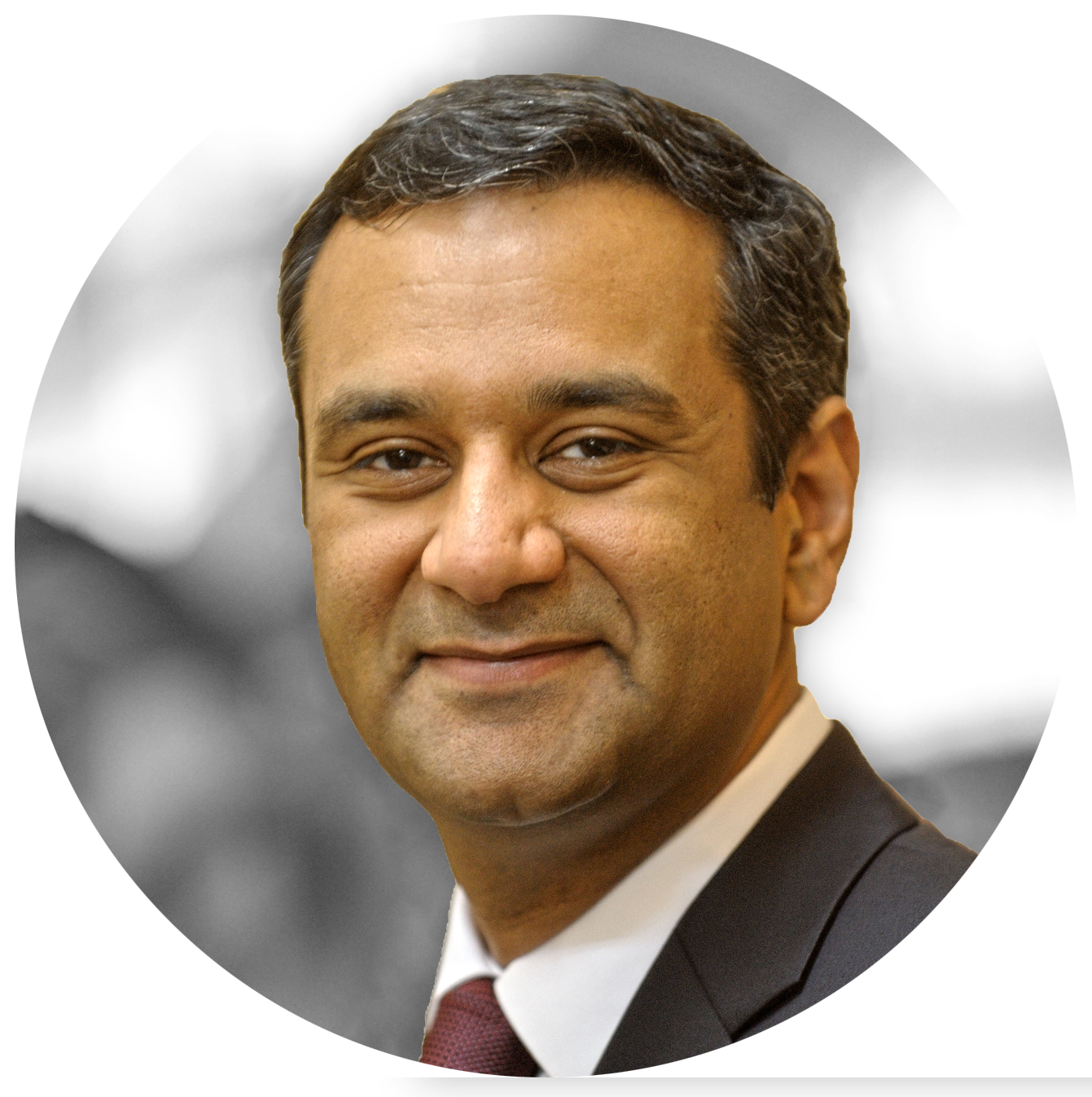
Rohit Bhargava
University of Illinois at Urbana-Champaign
BIOENGINEERING • IMAGING • FOUNDING PROFESSOR
Research Description
Rohit Bhargava is Founder Professor of Engineering and Director of the Cancer Center at the University of Illinois at Urbana-Champaign (UIUC). His primary appointment is in the Department of Bioengineering and serves as an affiliate Professor in the Carle-Illinois College of Medicine. Prof. Bhargava’s research focuses on the imaging of tumors through chemical imaging and, more recently, making tumor models by 3D printing. Instruments developed in Prof. Bhargava’s laboratory are providing new ways to characterize and define cancer. Traditionally, cancer has been diagnosed by its shape and size. However, through the use of imagining, Prof. Bhargava hopes to diagnose cancer by its underlying molecular characteristics, allowing for better treatment in patients.
During his time at the University of Illinois at Urbana-Champaign, Prof. Bhargava has spearheaded the effort to connect the research community in new and exciting ways, building bridges between faculty, staff, students, physicians, and community partners to tackle the basic science and engineering questions that surround cancer. Earlier in his career, Rohit was the first assistant professor hired into the new Bioengineering Department at UIUC and played a key role in its establishment and development. More recently, Prof. Bhargava’s interdisciplinary approach to cancer research led him to found the Cancer Center at Illinois, which is combining high quality technology and engineering with the field of oncology.

Thomas Gajewski
University of Chicago
IMMUNOLOGY • MELANOMA • FOUNDER
Research Description
Thomas Gajewski is a Professor in the Departments of Pathology and Medicine, as well as the The Ben May Department for Cancer Research. Prof. Gajewski also leads the Immunology and Cancer Program at the University of Chicago Comprehensive Cancer Center and directs the Human Immunologic Monitoring core facility. Prof. Gajewski and his team study the regulation of T cells (a critical component of the immune system) to promote their ability to fight diseases. This includes the creation of novel therapies to fight cancers like melanoma through the body’s immune system.
Developments in the lab have led Prof. Gajewski to commercialize several innovations, bringing them closer to patients. In 2013, Prof. Gajewski co-founded Jounce Therapeutics, which has gone on to raise more than $100M in investment, before going public in 2017. The company is now conducting clinical trials in cancer patients and has a market valuation of nearly $500m. Prof. Gajewski is also a serial inventor with licensing agreements with both Aduro Biotech and Evelo, a new company focused on the microbiome and cancer. In total, Prof. Gajewski has published more than 200 papers, served on numerous NIH grant review panels, and is an editor for multiple journals. He was also recently awarded the first American Cancer Society-Jules L. Plangere Jr. Family Foundation Professorship in Cancer Immunotherapy.
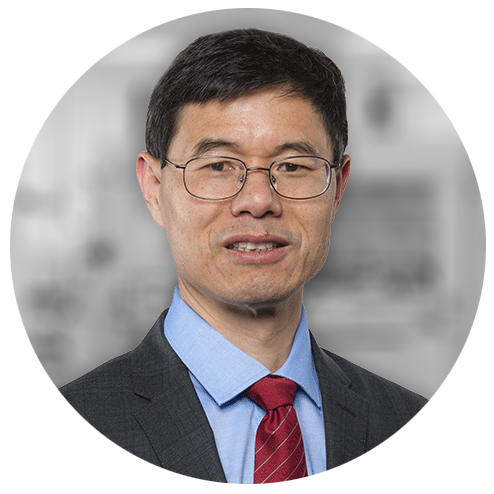
Wenbin Lin
University of Chicago
NANOMEDICINE • RENEWABLE ENERGY • FOUNDER
Research Description
Wenbin Lin is the James Franck Professor of Chemistry, Radiation & Cellular Oncology, and the Ludwig Center for Metastasis Research at the University of Chicago. Prof. Lin and his team of researchers have pioneered the design of solid materials based on metal-organic frameworks (MOFs). These MOFs combine metal ions with organic compounds to form structures. Prof. Lin and his team are exploring applications for these structures in renewable energy, sustainable catalysis, and medical nanotechnology. In renewable energy, Prof. Lin’s group uses MOFs to convert sunlight into chemical fuels. In sustainable catalysis, Prof. Lin’s group has developed new strategies to use cheap and abundant metals to replace precious metals. In nanomedicine, Prof Lin’s group is developing materials for biomedical imaging and drug delivery and new methods to provide targeted treatment for tumors for improved cancer therapy.
To bring this new cancer treatment method closer to patients, Prof. Lin. founded RiMO Therapeutics. RiMO’s technology uses MOFs to improve radiation absorption during radiotherapy, while also helping the immune system attack cancer cells. RiMO was founded with support from the University of Chicago’s Polsky Center for Entrepreneurship and Innovation. RiMO is currently conducting phase 1 clinical trial on its first drug candidate.

Andrew Wilber
Southern Illinois University
BLOOD DISORDERS • GENE THERAPY • NATURAL KILLER CELLS
Research Description
Andrew Wilber is an Associate Professor in the Department of Medical Microbiology, Immunology and Cell Biology at the Southern Illinois University School of Medicine (SIU SOM) in Springfield. Prof. Wilber’s research focuses on gene therapy for hemoglobin disorders, such as Sickle Cell Anemia and Beta-thalassemia, as well as anti-tumor immunity. Up to half a million babies per year are born with severe hemoglobin disorders that can significantly reduce length and quality of life. Prof. Wilber’s research focuses on gene therapy to correct hemoglobin production, which shows promise as an eventual curative treatment for patients afflicted with these diseases. Prof. Wilber’s research also focuses on the role of natural killer (NK) immune cells, with the ultimate goal of improving their ability to fight cancer in the body.
In addition to his role as a researcher within the Department of Medical Microbiology, Immunology and Cell Biology, Prof. Wilber is also Director of the Public Health Laboratory Sciences graduate program. In April, 2018, Prof. Wilber and his collaborators were recognized with Innovate Springfield’s Healthcare Medical Research Innovator of the Year award for their Novel Hemoglobin Gene Therapy to treat Sickle Cell Anemia and Beta-thalassemia.

Lori Andrews
Illinois Institute of Technology, Kent School of Law
GENETIC TECHNOLOGY • SOCIAL NETWORKS • PROLIFIC AUTHOR
Research Description
Lori Andrews is a Distinguished Professor of Law and Director of the Institute for Science, Law and Technology at Illinois Institute of Technology’s Chicago-Kent School of Law. Prof. Andrews is an expert on emerging technologies, including genetic technologies and social networks; she was listed by the National Law Journal as one of the 100 most influential lawyers in America. Her work focuses on the impact of technologies on individuals, relationships, families, communities, and social institutions. She has been an adviser to Congress, the World Health Organization, the National Institutes of Health, the Centers for Disease Control and Prevention, the Institute of Medicine of the National Academy of Sciences, and several foreign nations.
Professor Andrews has published more than 150 articles on biotechnology, genetics and social networks as well as 11 nonfiction books, including I Know Who You Are and I Saw What You Did: Social Networks and the Death of Privacy. Prof Andrews is also the author of three novels—scientific thrillers featuring a female geneticist. She has appeared on numerous television programs, including “Nightline” and “The Oprah Winfrey Show.” The American Bar Association described her as “a lawyer with a literary bent and the scientific chops to rival any CSI investigator.”

William Dichtel
Northwestern University
WATER PURIFICATION • EXPLOSIVES DETECTION • FOUNDER
Research Description
William Dichtel is the Robert L. Letsinger Professor of Chemistry at Northwestern University. Prof. Dichtel’s research focuses on covalent organic frameworks (COFs), an emerging type of polymer. These polymers are capable of absorbing pollutants and removing them from water, leading to the creation of more efficient systems for water purification. In addition to application in energy generation and storage, these organic polymers can also be applied to the detection of explosives. Prof. Dichtel’s groundbreaking work in polymers was rewarded with a Genius Grant from the Macarthur Foundation in 2015.
To further his outstanding academic research, Prof. Dichtel co-founded Cyclopure in 2016 to bring his advances in water purification to the market. With Prof. Dichtel as Chief Science Officer, Cyclopure is pioneering advanced material absorbents that safely and rapidly remove thousands of hazardous micropollutants from water. In addition to significant seed funding, Cyclopure was awarded a Small Business Innovation Research (SBIR) grant from the National Institutes of Health to continue development of their novel technology. The research strength of Prof. Dichtel and his team at Northwestern also led him to be named a Guggenheim Fellow by the John Simon Guggenheim Foundation in 2018.

Hao Feng
University of Illinois at Urbana-Champaign
POWER ULTRASOUND • FOOD SAFETY • DRYING
Research Description
Hao Feng is a Professor of Food and Bioprocess Engineering at the University of Illinois at Urbana-Champaign (UIUC). Prof. Feng’s research focuses on high intensity ultrasound (power ultrasound) and its application in food processing and preservation, enhancing the safety and quality of fresh foods. This research can also be applied in the conversion of biomass to biofuels. Prof. Feng is also Site Director of the Center for Advanced Research in Drying (CARD) at UIUC, which is funded through the NSF Industry–University Cooperative Research Centers (IUCRC) Program. CARD is devoted to working with industry to address issues of energy conservation, sustainability and product quality in a range of sectors, including paper and forestry products, food and agriculture, chemicals, textiles, and biopharmaceuticals.
Prof. Feng is a member of the Institute of Food Technologists (IFT), the American Institute of Chemical Engineers (AIChE), and the American Society of Agricultural and Biological Engineers (ASABE). As an international expert in the field of power ultrasound application, Prof. Feng also co-editor of the 2011 book Ultrasound Technologies for Food and Bioprocessing. In total, Prof. Feng has authored over 100 peer reviewed articles in the field of food and bioprocessing.
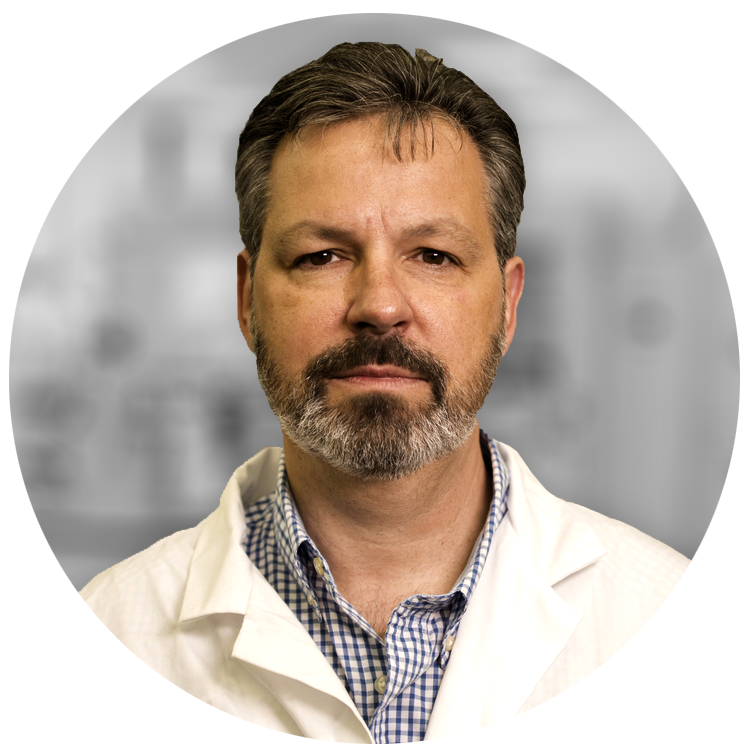
Oliver Hofstetter
Northern Illinois University
INTERDISCIPLINARY • INVISIBLE FINGERPRINTS • COLLABORATOR
Research Description
Oliver Hofstetter is an Associate Professor in the Department of Chemistry and Biochemistry at Northern Illinois University. Prof. Hofstetter’s research focuses on the use of stereoselective antibodies and their application as “tailor‐made” chiral selectors in affinity techniques. His interdisciplinary research combines aspects of immunology, protein chemistry, analytical chemistry, and molecular biology. More recently, Prof. Hofstetter has become interested in fingerprint technology, where he is now working to develop improved fingerprint detection methods for law enforcement.
In 2018, the National Institute of Justice (NIJ) awarded a grant of more than $628,000 over two years to Prof. Hofstetter to support his efforts to develop new user-friendly techniques and devices for recovering and visualizing invisible fingerprints. To support this work, Prof. Hofstetter and his team of scientists are working with several law enforcement agencies, including the U.S. Secret Service and Royal Canadian Mounted Police. Currently, Prof. Hofstetter is collaborating with scientists at the University of Technology Sydney (UTS) and Western Sydney University (WSU) in Australia, where formal testing will be conducted on the “next-generation fingermark lifters and on-the-spot visualization devices.” Prof. Hofstetter and his colleagues have raised $1.4 million for this type of research.

Stephen Long
University of Illinois at Urbana-Champaign
PLANT BIOLOGY • PHOTOSYNTHESIS • BIOFUELS
Research Description
Stephen Long is the Ikenberry Endowed University Chair of Crop Sciences and Plant Biology at the University of Illinois at Urbana-Champaign. Prof. Long is an international expert in plant science whose research focuses on improving photosynthesis to increase food and bioenergy production. Using the computing power available at Illinois, Prof. Long simulated the entire photosynthesis process—leading to new approaches that he has applied to boost productivity in crop field trials. Through this research, Prof. Long and his colleagues were able to accelerate a process that plants use to adjust to changing light, which increased crop productivity by 20%. This work is sponsored by the Gates Foundation, Foundation for Food and Agriculture Research, and the UK Department for International Development.
In addition, Prof. Long is the director of research projects that model and test the effect of climate change on agricultural systems, develop autonomous robots that help identify yield-boosting genetics, and engineer energy cane to produce a sustainable supply of biodiesel and bio-jet fuel. Prof. Long has published over 250 peer-reviewed journal articles, including original research published in Nature and Science. Thomson Reuters has named Prof. Long a “Highly Cited Researcher” in Animal and Plant Biology every year since 2006 and one of the “Most Influential Scientific Minds.” In 2013, he was elected a Fellow of the Royal Society.

Edward Colgate
Northwestern University
ROBOTICS • DYNAMIC TEXTURES • SERIAL ENTREPRENEUR
Research Description
Edward Colgate is the Allen K. and Johnnie Cordell Breed Senior Professor in Design in the Department of Mechanical Engineering at Northwestern University. Prof. Colgate’s research focuses on the interaction between humans and robots. This includes research on human interaction via touch displays, the operation of robotics through remote control, and robotic devices meant to provide assistance to humans. Prof. Colgate is also among the leadership faculty of Northwestern’s Neuroscience and Robotics Lab, a collaboration among faculty and students in engineering, neuroscience, and computer science, as well as the Shirley Ryan AbilityLab.
In addition to his academic research accomplishments, Prof. Colgate is a serial entrepreneur and inventor who holds more than a dozen patents. As an entrepreneur, Prof. Colgate has co-founded three companies; Kinea Design, which developed robotic assist devices for physical therapy; Cobotics, which provides human interface technologies for industry; and his most recent venture Tanvas, which is developing touch screen with dynamic textures. Applications for Tanvas’ touch screen technology include consumer electronics, gaming, retail, and for the visually impaired. In 2017, Tanvas’ technology was listed on WIRED’s Top 10 Sharpest Designs and received The Verge’s Best of CES “Most Touching” Award.

Bing Liu
University of Illinois at Chicago
SENTIMENT ANALYSIS • MACHINE LEARNING • DATA MINING
Research Description
Bing Liu is a Distinguished Professor of Computer Science at the University of Illinois at Chicago (UIC). Prof. Liu is an expert in sentiment analysis and opinion mining, data mining, machine learning, and natural language processing. His research has advanced the field of sentiment analysis, which uses computational methods to identify and categorize opinions expressed in a piece of text. Prof. Liu has also worked on using association rules to provide an innovate means for classification in data mining. In the era of social media and online reviews, applications for Prof. Liu’s research continue to grow. One such application is in the detection of fake online reviews, which have become pervasive in recent years.
Since 2013, Prof. Liu has turned his attention toward lifelong machine learning—the concept of continuous learning in machines. In 2016, he published the first ever book on the subject with his student Zhiyuan Chen. In total, Prof. Liu has authored over 200 articles and four books. Prof. Liu has received numerous distinguished awards and honors, including being named a fellow of the Association for Computing Machinery (ACM), the Association for the Advancement of Artificial Intelligence (AAAI), and the Institute of Electrical and Electronics Engineers (IEEE).

Mohammad Shahidehpour
Illinois Institute of Technology
POWER SYSTEMS • MICRO GRID • SMART CITIES
Research Description
Mohammad Shahidehpour is a University Distinguished Professor and the Bodine Chair Professor in Electrical and Computer Engineering at IIT. He also serves as the Director of the Robert W. Galvin Center for Electricity Innovation and Associate Director of WISER. He is a Fellow of IEEE (Institute of Electrical and Electronics Engineers), Fellow of AAAS (American Association for the Advancement of Science, Fellow of NAI (National Academy of Inventors, and a member of NAE (US National Academy of Engineering).
Dr. Shahidehpour has been the Principal Investigator of $60 million grants and contracts on smart grid research and development. His DOE Project on Perfect Power Systems has converted the IIT Campus to an islandable microgrid which has been in operation since 2013. He has co-authored 6 books and 600 papers on electric power systems and was the recipient of 6 best paper awards for his IEEE publications. He was the founding Editor-in-Chief of the IEEE Transactions on Smart Grid and serves as the Editor-in-Chief of the Journal of Modern Power Systems and Clean Energy. Dr. Shahidehpour was the 2009 recipient of an honorary doctorate from the Polytechnic University of Bucharest.
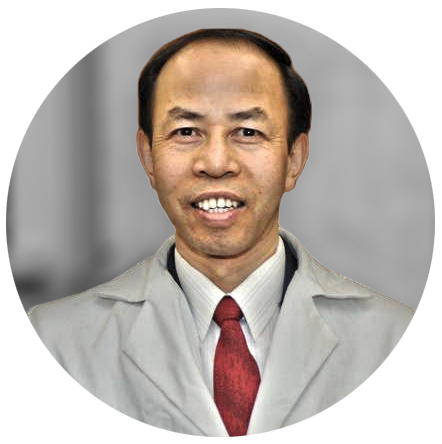
Zhili Xiao
Northern Illinois University
NANOTECHNOLOGY • MICROSENSORS • INVESTOR
Research Description
Zhili Xiao is a Professor in the Department of Physics at Northern Illinois University and Physicist at Argonne National Laboratory. Prof. Xiao is renowned for his work in nanomaterials and “rewritable magnetic charge ice.” In 2005, Prof. Xiao and his research team at Argonne developed an ultra-fast hydrogen sensor that was listed as one of the world’s top 100 scientific and technological innovations of the year by R&D Magazine. Based on nanotechnology, the sensors could be made smaller than a grain of sand and will greatly increase safety for future hydrogen-powered vehicles. Prof. Xiao also has developed ways to create specifically shaped nanoparticles, nanowires, and nanoribbons, each with applications in nanodevices of the future.
In 2016, Prof. Xiao published research in Science Magazine on rewritable magnetic charge ice. With potential applications involving memory, data storage and logic devices, magnetic charge ice might someday lead to smaller and more powerful computers or even play a role in quantum computing. Research on rewritable magnetic charge ice made the list of the top 2017 stories from the U.S. Department of Energy’s Office of Science and recent progresses were reported in Nature Nanotechnology. Prof. Xiao also holds four NIU patents involving sensors and devices.

Brandon Cox
Southern Illinois University
HEARING LOSS • HAIR CELL REGENERATION • MICROSENSORS
Research Description
Brandon Cox is an Associate Professor of Pharmacology at the Southern Illinois University (SIU) School of Medicine. Prof. Cox’s research focuses on restoring hearing in patients with hearing loss. Approximately 36 million Americans suffer from hearing loss, making it one of the most common disabilities in the United States. Exposure to loud noise or certain types of drugs causes damage to specialized sound-sensing cells in the inner ear called hair cells, which results in hearing loss. Treatments for hearing loss, such as hearing aids and cochlear implants, provide some benefit but do not restore normal hearing. The goal of Prof. Cox’s research is to stimulate regeneration of hair cells after damage as a treatment strategy for hearing loss
Prof. Cox is among the SIU School of Medicine’s most promising young faculty. Her research is supported by both the National Institutes of Health and the Department of Defense. Prof. Cox’s recent publication in the journal Frontiers in Cellular Neuroscience investigates how Notch signaling impacts spontaneous hair cell regeneration. Research advancements in hearing loss and restoration are just the beginning for Prof. Cox. In July 2018, she was awarded tenure by the SIU Board of Trustees and promoted to the rank of Associate Professor.

Yamuna Krishnan
University of Chicago
DNA NANODEVICES • BIOLOGICAL IMAGING • NEURODEGENERATION
Research Description
Yamuna Krishnan is a Professor of Chemistry at the University of Chicago. Prof. Krishnan works on the cutting edge of science in DNA nanotechnology. Specifically, Prof. Krishnan’s research is exploring DNA nanodevices deployed to probe, program, and reprogram living cells, or even whole organisms. These DNA nanodevices are formed from a collection of synthetic DNA strands that can be engineered to conduct new functions. Given the powerful ability to engineer a range of functionalities into DNA nanodevices, Prof. Krishnan’s lab seeks to create new powerful biological imaging tools capable of studying decades-old bottlenecks that have prevented quantitative measurements required to answer questions in systems biology. Such technology has the potential to identify neurodegenerative diseases like Alzheimer’s and Parkinson’s with a single test.
Prof. Krishnan has won several awards for her outstanding research. She is the youngest female recipient of the Shanti Swarup Bhatnagar Prize for science and technology, the highest science award in India, which she won in 2013. Prof. Krishnan also received the Indian National Science Academy Young Scientist Medal in 2007, Innovative Young Biotechnologist Award from the Dept. of Biotechnology, Govt. of India, in 2006, and the Infosys Prize for Physical Sciences in 2017.

Xue-Jun Li
University of Illinois College of Medicine at Rockford
STEM CELLS • NEUROLOGICAL DISEASE • SPINAL INJURY
Research Description
Xue-Jun Li is an Associate Professor in the Department of Biomedical Sciences at the University of Illinois College of Medicine at Rockford. Prof. Li’s research focuses on stem cell-derived neurons and the study potential treatment of neurological diseases and spinal injuries. As lead author, Prof. Li published the seminal report on the specification of spinal motor neurons from human pluripotent stem cells (a type of self-replicating stem cell). This paradigm developed Prof. Li has been widely used in motor neuron research. More recently, Prof. Li’s lab has successfully established human stem cell models for spinal muscular atrophy and other degenerative disorders.
Prof. Li has published over 40 peer reviewed manuscripts and 3 book chapters. Her research is supported by grant funding from the National Institute of Health, the Connecticut Stem Cell Research Program, the Spastic Paraplegia Foundation, and the ALS Association. Prof. Li also holds a patent for her method of in vitro differentiation of neural stem cells and spinal motor neurons. These accomplishments in stem cell research for neurodegenerative diseases is just the start for Prof. Li, who also intends to identify therapeutic agents for the treatment of these debilitating diseases.

Christopher Mulligan
Illinois State University
ANALYTICAL DEVICES • MASS SPECTROMETRY • POLLUTANT MONITORING
Research Description
Christopher Mulligan is an Associate Professor of Analytical Chemistry at Illinois State University. Prof. Mulligan has over 15 years of experience in developing miniaturized analytical devices, with specific expertise in portable and miniaturized mass spectrometric instrumentation development, novel ionization methods, and application development. Through his research, Prof. Mulligan seeks to demonstrate the impact and practicality of portable MS systems for use in crime scene investigation, law enforcement, and environmental pollutant monitoring.
Prof. Mulligan’s research on portable MS systems is funded by the National Science Foundation (NSF) and National Institute of Justice (NIJ). He has conducted field research with the Army Corp of Engineers, Forensic Technology Center of Excellence (FTCoE) at Research Triangle Institute, U.S. National Guard Civil Support Teams, and various local and state level police agencies. Although still early in his career, Prof. Mulligan has been recognized for his research contributions through inclusion in the 2015 “Emerging Investigators in Analytical Sciences” special issue of Analytical Methods and selection to the 2017 “Magnificent Tens” Power List by Analytical Scientist Magazine; Prof. Mulligan was a Top 10 entry in the “Public Defenders” category, highlighting the work of researchers “protecting people and the planet.”

